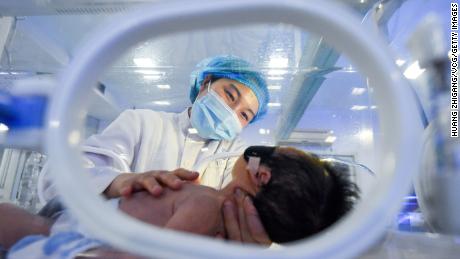
A medical worker takes care of a newborn baby lying inside an incubator on the eve of Chinese New Year on February 11 in Jingzhou, Hubei Province of China.
Faced with a
worrying demographic crisis of its own making, China is encouraging couples to have more children.
There's just one problem: women aren't too keen on the idea.
For more than 35 years, the ruling Communist Party strictly enforced a one-child policy, as the country tried to address overpopulation and alleviate poverty. But as the economy boomed, China found its population aging and its labor force shrinking.
In a bid to mitigate the economic risks posed by falling birthrates, the party
announced in 2015 that it would allow married couples to have two children. But after a brief uptick in 2016, the national birth rate has been falling year on year — prompting the party to
loosen the policy even further to three children.
Still, the public doesn't appear convinced. The formal passing of the country's new three-child policy into law on Friday was met with widespread skepticism and criticism on Chinese social media, with many women expressing anxiety over the rising cost of living and entrenched gender inequality in the workplace.
Many argued that raising three children would be prohibitively expensive, and out of reach for most urban couples, many of whom face stagnating wages, fewer job opportunities, and grueling hours at work.
"I don't even want to have one child, let alone three," said one comment on Weibo, China's heavily censored Twitter-like platform, which garnered more than 51,000 likes.
Though wealth inequality and overwork are problems seen around the world, in China they are exacerbated by entrenched gender roles that often place the bulk of housework and childcare on women.
"Will men have paternity leave for their three children, then?" one person wrote pointedly on Weibo, with more than 67,000 likes. There is currently no national law that provides paternity leave in China.
That imbalance in parental responsibility means it's difficult for women to balance work with motherhood. Ever since the proposal for the three-child policy was announced
earlier this year, much of the debate has centered on fears that it could ultimately worsen conditions for working women.
In recent years, many Chinese women have reported facing
job discrimination based on their marital or parental status, with employers who are often reluctant to pay maternity leave.
A report by Human Rights Watch earlier this year, which drew on studies, social media reports, news coverage, court documents, and interviews, found that women in some companies are told to wait their turn to take maternity leave; if they become pregnant ahead of "schedule," they can be fired or punished.
Unsurprisingly, many younger career-minded women in China have become increasingly disillusioned with traditions and institutions like
marriage and childbirth.
"As a woman, I feel like I am on a narrower and narrower path, and there is no turning back," posted a women's rights group
on Weibo on Thursday, in response to the new policy.
The Communist Party has acknowledged these issues and pledged to address them. The new amendment promises to protect women's right to employment, and says the government will work with the private sector to set up childcare facilities in public areas and workplaces, said state-run news agency
Xinhua.
The government will also "roll out more supportive measures in terms of finance, taxation, insurance, education, housing and employment, to ease the burden on families," Xinhua added.
The text of the amended family planning law isn't publicly available yet. Articles by Xinhua and other state-run media don't provide further specifics on how those protective measures will be implemented, such as whether there will be harsher penalties for employers who discriminate against mothers.
Though a number of cities and provinces already provide some of the measures activists have called for — Shanghai offers 10 days of paternity leave, for instance — they are still too limited, and a far cry from the nationwide reform needed to lift the birth rate, some experts say.
In 2019, the national birth rate hit its
lowest level in 70 years since the founding of the People's Republic of China; the following year, the number of newborns
dropped another 18%.
That means the country — the world's most populous, with 1.4 billion residents — has seen its
fertility rate sink from more than five births per woman to less than two, in just 40 years. That's one of the lowest fertility rates in the world, on par with Japan and South Korea, both of which are also facing looming demographic crises.
"If the country can't protect women's rights, but only encourage childbirth, it doesn't matter if the maternity leave is 98 days or three years — it is equivalent to taking away their career,"
said Xu Chao, a doctor in Shandong.
For women in China, who have struggled for so long in the workplace and who now enjoy relatively independent lives, having more children requires tremendous sacrifice — and it will take much more than a simple revision of the law to encourage a baby boom.
Source




You have provided a nice article, Thank you very much for this one. And I hope this will be useful for many people. And I am waiting for your next post keep on updating these kinds of knowledgeable things Magnetic Door Sensor Suppliers In China
ReplyDeleteRight up 'til today the print business catalog contain a lot of beautiful, one page show advertisements that include legal counselors offering their administrations, and legal advisors pay a ton for these promotions.brooklyn injury lawyer
ReplyDeleteinjury lawyer
This is very useful, although it will be important to help simply click that web page link: silk pjs womens
ReplyDelete